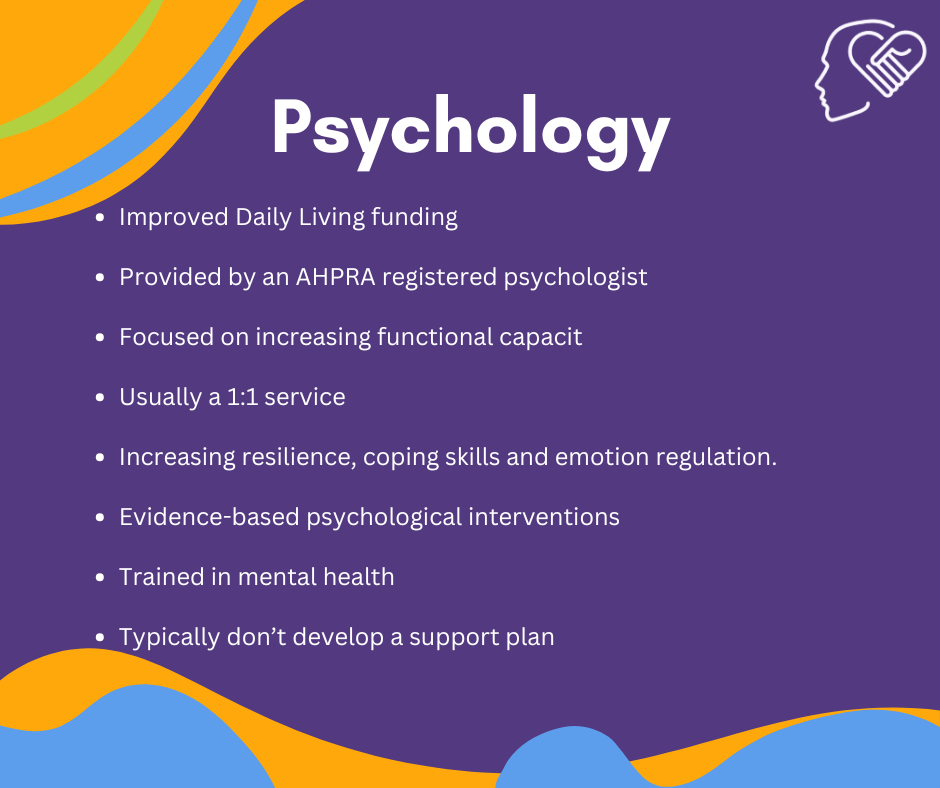Psychology vs Behaviour Support
- One Step Ahead

- Jul 5, 2025
- 3 min read
Unpacking what a psychologist and behaviour support practitioner actually do, and what might be the best fit for you.
So…what is the difference between a psychologist and behaviour support practitioner? They’re both the same, right?
🙅♀️Wrong! Psychology and behaviour support services are very different in their approach and purpose, and what is going to be the most beneficial for you is dependent on what your support needs and goals are. While there may be some overlap between what psychologists and behaviour support practitioners can support with, it is important to understand the differences between the two so you can make an informed decision of what type of support might be the most helpful for you.
You can receive NDIS funding to access support from a psychologist and a behaviour support practitioner at the same time – this can be helpful to have clear roles and responsibilities within your allied health team, and receive specialised support from each practitioner.

🧠Psychology
Uses funding from the Improved Daily Living category of supports – this is also used by occupational therapists, speech pathologists, physiotherapists and other allied health practitioners.
Can only be provided by an AHPRA registered psychologist and can be provided by non-NDIS registered providers (if funding is self or plan-managed).
Focussed on increasing functional capacity, and reducing the impact of functional impairments directly related to the persons disability.
Usually a 1:1 service, where the psychologist will work directly with the person receiving support – this typically includes regular therapy sessions with a focus on increasing resilience, coping skills and emotion regulation.
Uses evidence-based interventions that psychologists are trained to use – such as dialectical behaviour therapy (DBT), acceptance and commitment therapy (ACT) and mindfulness practices.
Psychologists are trained in assessing and support individuals with who are experiencing challenges with their mental health.
Psychologists may provide “homework” or intervention programs to continue interventions outside of sessions but typically don’t develop a support plan.

✨️Behaviour Support
Uses funding from the Behaviour Support category – only behaviour support practitioner are able to claim from this support category.
Can only be provided by an NDIS registered behaviour support practitioner, who is working with an NDIS registered behaviour support provider.
Focussed on improving quality of life, primarily through reducing the impact of “challenging” behaviours.
Uses functional behaviour assessment to identify factors that influence behaviour, and what the behaviour is attempting to communicate (the function).
Supports with identifying, assessing, and reporting on restrictive practices – the goal of behaviour support is to fade out restrictive practices in a safe and sustainable way.
Develops a behaviour support plan for guidance on how to respond to high-risk behaviours, and how to support with skill development to build on independence.
Intervention is usually focussed on modifying the environment, responses to behaviours and support provided to reduce behaviours of concern.
Works closely with family, school, SIL providers, and other allied health professionals to implement behaviour support plans.
If you have behaviour support AND psychology within your plan, make sure your clinicians connect and work together! Often their goals will be closely linked, and they can work together to help you get to where you want to be – they just have different methods of getting there!
An example of how a psychologist and behaviour support practitioner might work together;
Psychologist | Behaviour Support Practitioner |
Fortnightly 1:1 sessions with the participant in a clinic with a psychologist | Fortnightly home visits with the participant, their family and support workers |
Intervention focussed on capacity building of the participant - problem solving, emotion regulation and anxiety management | Intervention focussed on assessing the home environment and building the capacity of the participants wider support network |
Functional assessment, and monitoring of impact of mental health, impact on wellbeing and behaviours shared with care team | Management of restrictive practices, development a behaviour support plan and authorisation |
Parent and carer education provided to assist with understanding the individuals thinking patterns and emotional wellbeing | Training in behaviour support plan with the participant, their family and support workers. Focus on supporting them to implement reactive and proactive strategies. |
Minimal report writing - initial assessment report and end of plan report showing outcome of interventions/goals. | High level of report writing - behaviour assessment report, interim and comprehensive behaviour support plan and end of plan report. |
In this scenario, both therapists will collaborate with each other - the behaviour support practitioner includes recommendations from the psychologist in their behaviour support plan, and they work together to understand how to best support the person.
If you’d like to talk more about what allied health supports may be helpful for you, we’d be happy to help! Please contact us at office@onestepaheadhealth.com.au or enquire through our website ✨️



